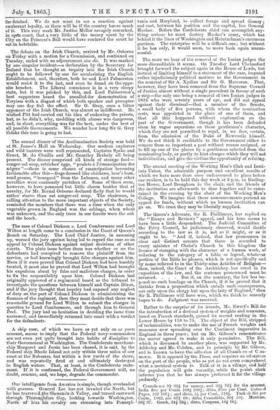The Queen's Advocate, Sir R. Phillimore, has replied on the
"Essays and Reviews" appeal, and his tone seems to have been a little despondent. The Judicial Committee of the Privy Council, he judiciously observed, would decide according to the law as it is, not as it might, or as it ought to be. "And if, indeed, that law pronounces in clear and distinct accents that there is accorded to every minister of Christ's Church in this kingdom the licence of stamping with the character of a human work, of reducing to the category of a fable or legend, whateN or portion of the Bible he pleases, which is not specifically and by name referred to in the Thirty-nine Articles of Religion— then, indeed, the Court of the Archbishop has erred in its exposition of the law, and the sentence pronounced must be reversed. . . . But if, on the contrary, the law has im- posed no such bondage on the Church, if it be proved that it shrinks from a proposition which entails such consequences, not only upon the clergy but upon the laity of England," then Sir It. Phillimore will have won, which we think he scarcely hopes to do. Judgment was reserved.






























 Previous page
Previous page